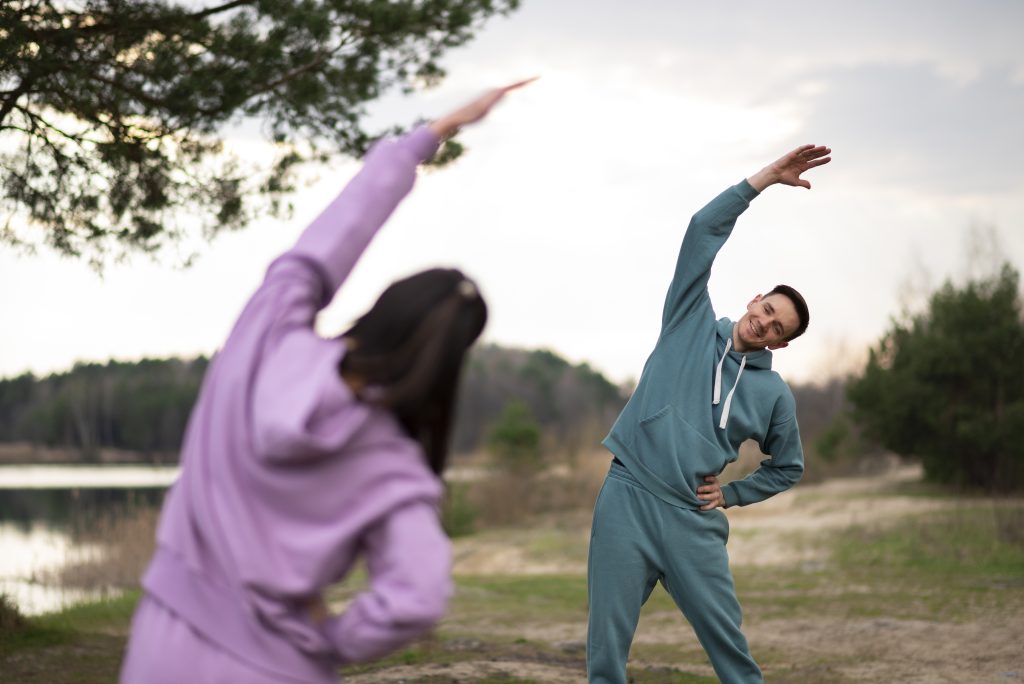Outdoor Activities That Boost Mental Health
Natalie Brooks August 19, 2025
In a world where screen time and digital overstimulation dominate many of our mornings and evenings, a quieter revolution is blossoming—nature-based wellness. This emerging trend underscores the power of outdoor experiences to foster mental clarity, reduce stress, and restore emotional balance. Whether it’s brief daily contact with urban greenery, immersive farm hospitality, or workplace programs that bring employees outside—the movement is gaining momentum.
The global wellness economy surpassed 5.6 trillion dollars in 2024 and is projected to grow to 8.5 trillion dollars by 2027, with outdoor and nature-focused activities playing an increasingly visible role in that growth. People are no longer satisfied with indoor-only wellness solutions; instead, they are actively seeking ways to integrate the natural world into their daily routines.

The Trends Taking Off: From Farm Stays to Green Work Breaks
1. Regenerative Farming and Wellness Travel
Modern travelers are seeking more than relaxation—they want purpose, immersion, and healing. Regenerative farming retreats—luxury stays that immerse guests in biodynamic agriculture and natural rhythms—are expanding across Europe, Asia, and the Americas. These experiences offer hands-on gardening, farm-to-table meals, and holistic environments that connect visitors to soil, seasons, and serenity.
According to the Global Wellness Institute, wellness tourism generated 651 billion dollars in 2022 and is expected to exceed 1.35 trillion dollars by 2028. Farm hospitality is a growing slice of this market, catering to travelers who want to step away from technology and reconnect with rhythms of the earth.
Case Example: In Tuscany, Italy, regenerative farm resorts have reported fully booked seasons, with many guests returning annually not just for the food and landscape, but for the mental reset they experience through physical connection with land and community.
2. Outdoor Wellness at the Workplace
Businesses worldwide are realizing that wellness isn’t just a perk—it’s a productivity driver. In 2025, more organizations are building programs that merge employee well-being with nature exposure. This includes outdoor gyms, rooftop gardens, walking meetings, and fresh-air breaks built into work schedules.
Studies show that employees who spend even short breaks outside report 23% higher concentration and 15% greater creativity in their workdays. With burnout now classified as an occupational syndrome by the World Health Organization, companies are turning to outdoor wellness as a preventative solution.
Case Example: A major tech firm in Silicon Valley redesigned its headquarters to include outdoor pods for brainstorming sessions, complete with greenery and natural light. Employees reported improved team cohesion and lower levels of workplace stress within six months of the program’s introduction.
3. Brief Daily Nature: Just 15 Minutes Matters
Recent research reveals that just 15 minutes per day in urban nature—like small parks, tree-lined streets, or rooftop gardens—can significantly improve mood and reduce stress. While extended retreats are powerful, even micro-doses of nature can bring measurable benefits.
For young adults, this is especially important. Mental health statistics continue to show rising levels of anxiety and depression among people aged 18–30. Incorporating short, consistent moments in nature provides a low-cost, accessible buffer against these challenges.
Case Example: In Tokyo, where green space is limited, city planners introduced “pocket parks”—tiny urban oases tucked between buildings. Residents who visited these spaces reported better mood regulation and stronger feelings of community.
Why It Works: The Science Behind Outdoor Mental Health Boosts
Stress Reduction and Mood Elevation
- Lower cortisol and blood pressure: Exposure to nature reduces the stress hormone cortisol, decreases blood pressure, and calms the nervous system.
- Emotional resilience: Natural settings foster mindfulness and interrupt repetitive anxious thought cycles.
Cognitive and Restoration Gains
Natural environments provide cognitive restoration, giving the brain a break from constant digital input. Stepping outside resets mental clarity, enhances focus, and improves problem-solving. A 2024 study found that people who worked near natural views performed 20% better on memory and attention tests.
Protective Effects Against Depression and Anxiety
Frequent outdoor recreation has been associated with lower depressive symptoms and higher emotional resilience. For older adults, consistent time outdoors is linked to reduced risk of depression and better quality of life.
Expanding the Horizon: Global Adoption of Nature-Based Wellness
Urban Wellness Design
Cities worldwide are redesigning infrastructure to incorporate wellness-driven outdoor spaces:
- Singapore: Urban planners integrate vertical forests into high-rise buildings, making greenery visible from nearly every office window.
- Copenhagen: Outdoor gyms, bike-friendly streets, and citywide walking trails are embedded into the culture of daily life.
- New York: Expanded “Open Streets” initiatives have created pedestrian-first corridors filled with greenery and space for recreation.
The Role of Governments and Policy
Governments are recognizing nature as a public health intervention. Countries like Canada and Japan now have initiatives that encourage “prescriptions for nature,” where doctors can recommend patients spend specific amounts of time outdoors as part of treatment plans.
Wellness Travel Boom
Nature-based wellness travel is rising among Millennials and Gen Z. A 2025 survey revealed that 67% of travelers under 40 prefer wellness trips that include direct interaction with outdoor activities, such as hiking, farming, or ocean-based programs like surf therapy.
Everyday Ways to Embrace Nature-Based Wellness
A. Daily Doses of Green
Even in dense urban environments, micro-moments in nature can provide benefits:
- Take a 15-minute walk through a tree-lined path.
- Eat lunch outdoors in a plaza or rooftop garden.
- Replace one indoor meeting with an outdoor discussion.
B. Outdoor Wellness at Work
Workplaces can be redesigned around outdoor wellness with simple strategies:
- Introduce walking meetings or brainstorming strolls.
- Encourage outdoor team-building activities such as group yoga.
- Create green corners indoors when outdoor access is limited.
C. Plan a Retreat That Grounds You
For deeper restoration, immersive experiences offer lasting effects. Regenerative farming retreats, eco-wellness lodges, and nature-centered yoga programs allow people to disconnect from digital life while reconnecting with themselves.
D. Structured Nature Therapy Practices
- Forest bathing (Shinrin-yoku): Slow forest walks that enhance mindfulness.
- Adventure therapy: Outdoor challenges that strengthen confidence and resilience.
- Surf therapy: Ocean-based wellness programs that combine physical activity and reflection.
- Therapeutic gardens: Purpose-built natural spaces that promote recovery and peace.
E. When Outdoors Aren’t Accessible
Virtual solutions are becoming viable alternatives for people without access to green spaces. Virtual reality forest bathing and immersive audio-visual nature therapy provide calming effects for older adults, hospital patients, or those in high-density cities.
Practical Guide: Integrating Nature-Based Wellness into Your Life
| Step | Action | Benefit |
|---|---|---|
| 1. Start Small | Schedule 15 minutes of outdoor time daily | Improved mood and reduced stress |
| 2. Get Intentional at Work | Add walking meetings or outdoor lunches | Boosted focus and creativity |
| 3. Plan an Immersive Retreat | Book a regenerative farm stay | Deep emotional reset and clarity |
| 4. Explore Therapy Options | Try forest bathing or surf therapy | Long-term resilience and well-being |
| 5. Use VR as Backup | Experience virtual nature environments | Accessible relaxation when outdoors isn’t possible |
Summary: The Promise of Nature-Based Wellness
From daily green breaks to immersive retreats, nature-based wellness is shaping the future of mental health. Backed by science, supported by cultural shifts, and increasingly embraced by workplaces and governments, outdoor activities are no longer just leisure—they are a cornerstone of modern wellness.
Whether you’re a city dweller seeking clarity, a professional aiming to boost productivity, or a traveler craving meaningful experiences, stepping outside can transform your mental landscape. Even small, consistent choices—like a 15-minute park visit or a walking meeting—can lay the foundation for stronger mental resilience, sharper cognition, and long-lasting well-being.
References
- Harvard T.H. Chan School of Public Health. (2023). Time spent in nature can boost physical and mental well-being. Available at: https://www.hsph.harvard.edu (Accessed: 19 August 2025).
- McLean Hospital. (2024). How nature helps mental health. Available at: https://www.mcleanhospital.org (Accessed: 19 August 2025).
- Frontiers in Psychology. (2025). Outdoor time and depression risk in middle-aged and older adults. Available at: https://www.frontiersin.org (Accessed: 19 August 2025).







